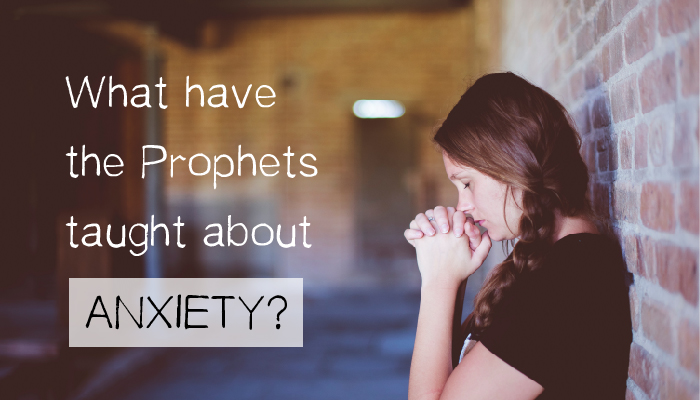
What Have the Prophets Taught About Anxiety?
Two phrases repeated often in scripture are “Fear not” and “Be of good cheer.” General Conference addresses resonate with variations on this theme, assuring listeners that everything will work out if they keep the faith, stay positive, and endure the pitfalls of life cheerfully. The value of such counsel is clear—but is much easier said than done when you suffer from an anxiety disorder.
According to the Anxiety and Depression Association of America, approximately 18% of the population, or 40 million people, are affected by anxiety in the United States alone. This potentially represents a significant proportion of Church members who struggle to get through daily life due to anxiety. In a religion that emphasizes choosing faith and joy over fear and depression, members who cannot simply choose not to have anxiety may feel isolated and discouraged by the well-meaning suggestion to “hang in there.” Surely this is not the prophets’ intent, so what have they actually said about anxiety?

No Shame
When you suffer from mental illness, there is often a tendency to feel that you are at fault. Having dealt with anxiety and depression myself, I know too well the burden of feeling that my struggles are a sign of weakness or unworthiness on my part. It is easy to look at all the people around you who seem to be “adulting” just fine and feel like a failure. But compounding the anxiety you feel with guilt will only make it harder for you to cope.
In his address Like a Broken Vessel, Elder Jeffrey R. Holland assures us that “however bewildering this all may be, these afflictions are some of the realities of mortal life, and there should be no more shame in acknowledging them than in acknowledging a battle with high blood pressure or the sudden appearance of a malignant tumor.”
Every one of us faces unique challenges throughout life. There is no shame in suffering from the natural consequences of living in a fallen world.

Learn from the Examples of Others
Anxiety disorders can be incredibly isolating. Your family and friends may struggle to understand what you are going through and how to be supportive—or, if you’re like me, your anxiety prevents you from approaching and confiding in others. Expressing your emotions feels too daunting or painful, or you worry that others will judge you. Even confiding in Heavenly Father and the Savior through prayer can be difficult.
But even if speaking to another living, breathing person is too much right now, you can still look to others for inspiration. Many important figures, both in and out of the Church, lived lives of meaning and purpose while battling mental illness. Elder Holland mentions “Abraham Lincoln, Winston Churchill, and Elder George Albert Smith, the latter being one…who battled recurring depression for some years before later becoming the universally beloved eighth prophet…of The Church.”

Some of you are thinking, “Yeah, right. I’m no Abraham Lincoln.” The purpose of learning from others is not for you to compare yourself to them, but to remind you not to discount your own potential. No matter how severe your symptoms, there is much good you can do and many ways you can positively influence the lives of others—even indirectly.
While serving on my mission, I took a fall and injured my arms severely. I could do almost nothing for myself. My companion had to assist me with everything—getting me ready in the morning, feeding me, even brushing my teeth. I felt humiliated and useless, and worried that I was preventing our work from progressing.
But I learned a valuable lesson from that experience. My injury, a circumstance outside my control, prevented me from doing and being all I desired and forced me to humble myself to a whole new level. I also saw significant growth in my companion as she took more responsibility and focused on serving me. The same principle applies to anxiety. Even though the process is incredibly frustrating, struggling through mental illness can bless others as well as ourselves.
Seek Counsel
“If things continue to be debilitating, seek the advice of reputable people with certified training, professional skills, and good values. Be honest with them about your history and your struggles. Prayerfully and responsibly consider the counsel they give and the solutions they prescribe. If you had appendicitis, God would expect you to seek a priesthood blessing and get the best medical care available. So too with emotional disorders. Our Father in Heaven expects us to use all of the marvelous gifts He has provided in this glorious dispensation.”
—Elder Jeffrey R. Holland
Confiding in trusted friends, family members, or priesthood leaders is good and necessary during any difficult time. During some of my worst moments, however, professional counseling was indispensable. Almost anyone can lend an empathetic ear, but only those trained to do so can help you develop the tools to cope with your symptoms.

I resisted seeking professional help for a long time because 1) I felt unsure that I had a real problem and didn’t want to complain, 2) I was ashamed of the idea that I needed that kind of assistance, and 3) I was anxious and afraid (surprise, surprise) of the unknown. Please don’t wait until your mental health is truly in crisis to seek help. I am now a big fan of therapy and counseling and would recommend them to anyone—because we all need a little mental health boost on occasion, disorder or not.
Take Care of Yourself
When the prophet Joseph Smith was translating the Book of Mormon, the Lord instructed him not to “run faster or labor more than you have strength” (Doctrine & Covenants 10:4). If a prophet of God needs to practice self-care, the same principle certainly applies to the rest of us.
Pay attention to how you’re feeling. Take Elder Holland’s advice to “watch for the stress indicators in yourself and in others you may be able to help. As with your automobile, be alert to rising temperatures, excessive speed, or a tank low on fuel. When you face ‘depletion depression,’ make the requisite adjustments. Fatigue is the common enemy of us all—so slow down, rest up, replenish, and refill. Physicians promise us that if we do not take time to be well, we most assuredly will take time later on to be ill.”
Elder L. Tom Perry speaks in his address, Let Him Do It with Simplicity, of a time when he and his wife were suffering from a great deal of strain: “We drove to a place just a few miles from our home to get away for a few moments of relief from our troubles, talk, and give emotional comfort to each other. Our place was Walden Pond. It was a beautiful little pond surrounded by forests of trees. … Walden Pond was our special place to pause, reflect, and heal. Perhaps it was partly due to its history—its connection to the efforts of Henry David Thoreau to separate himself from worldliness for a period of years—that Walden Pond offered us so much hope for simplicity and provided such a renewing escape from our overly complex lives.”

Elder Perry highlights two principles that help me to manage my anxiety: taking time for myself and simplifying my life. These things are difficult to do when anxiety pressures you with feelings of obligation and guilt. But I now realize that I am a better wife, mother, friend, and neighbor when I eliminate clutter from my life, and when I allow myself the time and space to rest. Doing the same will enable you to better serve those around you.
Lean on the Savior
The most important resource for any person, suffering from any kind of ailment, is the Atonement. The Savior offers the ultimate relief and healing from mental illness. Only He has suffered “pains and afflictions and temptations of every kind…that he may know…how to succor his people…” (Alma 7:11-12).
Elder Dallin H. Oaks says of the Savior, “Jesus healed many from physical diseases, but He did not withhold healing from those who sought to be ‘made whole’ from other ailments. Matthew writes that He healed every sickness and every disease among the people (see Matthew 4:23; 9:35). Great multitudes followed Him, and He ‘healed them all’ (Matthew 12:15). Surely these healings included those whose sicknesses were emotional, mental, or spiritual. He healed them all.” (He Heals the Heavy Laden).

Does this mean that all those with mental illness can expect to find a cure in this life? There are times when all the coping skills and medication in the world cannot relieve my anxiety and depression. My only saving grace during those times is my reliance on prayer, the scriptures, priesthood blessings, and temple attendance. Even then, my illness does not suddenly vanish. Elder Oaks reminds us that “sometimes a ‘healing’ cures our illness or lifts our burden. But sometimes we are ‘healed’ by being given strength or understanding or patience to bear the burdens placed upon us.”
You can find this strength, understanding, and patience as you follow Elder Holland’s counsel to “faithfully pursue the time-tested devotional practices that bring the Spirit of the Lord into your life. Seek the counsel of those who hold keys for your spiritual well-being. Ask for and cherish priesthood blessings. Take the sacrament every week, and hold fast to the perfecting promises of the Atonement of Jesus Christ. Believe in miracles. I have seen so many of them come when every other indication would say that hope was lost. Hope is never lost. If those miracles do not come soon or fully or seemingly at all, remember the Savior’s own anguished example: if the bitter cup does not pass, drink it and be strong, trusting in happier days ahead.”
I speak from experience when I say that dark days have an end. That end may linger a long way off, or come with more dark days on its heels. Even so, there is always a calm in the storm. We may not fully understand why we must wade through challenges like anxiety and other mental illnesses in this life, but we can rest assured that God wades with us. As we continue to hold fast to the Atonement and the words of the prophets, let us say with the apostle Paul, “therefore will I rather glory in my infirmities, that the power of Christ may rest upon me” (2 Corinthians 12:9).
Have you found comfort and strength in the words of the prophets to help you endure mental illness? Please comment and share your thoughts.









